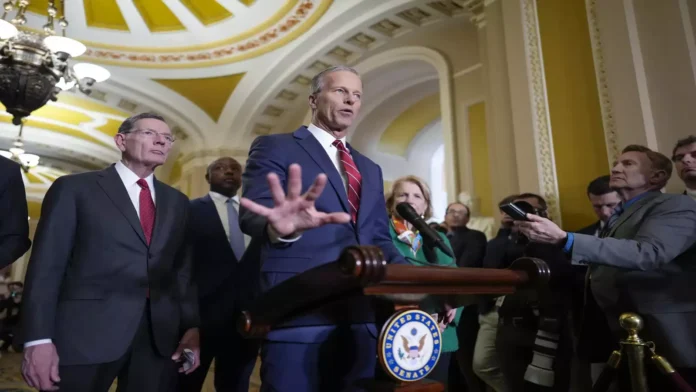Republican lawmakers in the House advanced a procedural step on Wednesday that sets the groundwork for pursuing a broad legislative package aligned with President Donald Trump’s policy goals. The vote, often referred to as a “rule vote,” allows debate to begin on a fiscal framework critical to the budget reconciliation process.
This vote doesn’t guarantee the bill’s final passage but is seen as a key early stage in moving forward with a measure that encompasses proposals on border security, defense, energy, and tax policy. The legislation narrowly advanced in a 216 to 215 vote, with three Republicans siding with Democrats to oppose it.
House Speaker Mike Johnson expressed optimism while acknowledging ongoing concerns from some members. “I believe we’ll get there,” he said ahead of the vote. “There are genuine concerns among some of our colleagues who want to see more meaningful budget reductions and real change in the direction of our national debt.”
Despite this initial success, it’s still uncertain whether Republicans can rally enough support for the final version of the legislation. Some lawmakers who supported allowing debate have already said they plan to vote against the final bill unless it includes stronger spending cuts.
The broader legislative effort is designed to move through budget reconciliation a parliamentary process that enables certain fiscal bills to pass the Senate with a simple majority rather than the usual 60 votes. This makes it a crucial strategy for advancing a comprehensive policy agenda when both chambers are closely divided.
In budget reconciliation, each chamber must pass a framework setting general spending and revenue targets. Committees then draft legislation that aligns with those targets. The House approved its version of the framework earlier this year, while the Senate recently passed a revised version. GOP leaders now see approval of the Senate’s version as a necessary next step toward writing policy details.
However, major differences remain between the House and Senate versions particularly around the scale of mandatory spending cuts. The House plan proposes at least $1.5 trillion in reductions, while the Senate’s version includes just $4 billion. This discrepancy has fueled skepticism among fiscal conservatives who are calling for clearer commitments to deeper cuts.
“We haven’t seen a real plan yet,” said Rep. Andy Ogles of Tennessee, who has been vocal in demanding more aggressive action on spending. “Until there’s something concrete, I’m not on board.”
As debate continues, Republican leaders are working to unite their party behind a single vision for tackling the federal budget, reducing the deficit, and enacting a slate of Trump-era policies through a single, sweeping legislative package.
For more political updates visit, DC Brief.


